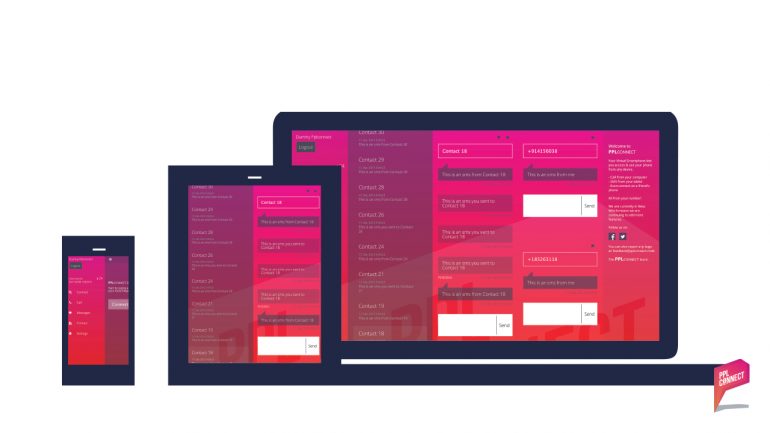After a conversation with Montreal startup Ppl Connect, I still can’t figure out if their technology amplifies humanity’s sad addiction with their smartphones, or if it alleviates some of the symptoms that come with this addiction.
There has arisen in the last decades clear problems associated with our dependence on both smartphones and being “connected” in general. By now we’re mostly all aware of the elephant in the room that is this addiction. We all accept it’s there but we won’t change our behaviour, and thus far little innovation has focused on enabling this. (Scholars like Sherry Turkle of MIT actually go as far as saying that this dependence on being connected destroys our sense of self.)
But Ppl connect, the company founded two years ago by Jenviev Azzolin and Denzil D’Sa, said their technology gives people more freedom in accessing their mobile world, alleviating the feelings of despair if one’s cell phone is either lost or dead.
The startup offers a web-based platform that connects directly with one’s Android smartphone, allowing users to access their information and contacts from any web-enabled device. All that is required is that the user downloads the Ppl Connect app, which synchronizes their smartphone to their cloud-based “virtual smartphone,” enabling access and use.
It’s a VoIP-based solution, but any calls or texts coming from the web platform comes from the user’s actual cell number. All calls and text conversations had through the virtual smartphone appears on one’s actual smartphone as if it took place there. Everything is synchronized.
The company charges $0.03 per minute for voice calls. Since Ppl Connect is a completely independent system, users are not using their network minutes when calling through the platform. In the future the startup plans to give users the option of using minutes from their mobile plan. Texting, meanwhile is completely free on Ppl Connect, as it goes through the user’s mobile plan.
For those of us who have forgotten our smartphone, don’t feel like carrying around a charger or don’t feel like dealing with any of the many headaches that revolve around our dependency on a single piece of hardware, the solution can clearly be helpful.
 “We started with the idea that we’re very heavy smartphones-users and mobile addicts, but how could we bring this to the next step in its evolution so that it could really be completely interoperable and accessible wherever you are in the world, at any time, on any screen on a device?” said Azzolin.
“We started with the idea that we’re very heavy smartphones-users and mobile addicts, but how could we bring this to the next step in its evolution so that it could really be completely interoperable and accessible wherever you are in the world, at any time, on any screen on a device?” said Azzolin.
The pair of cofounders both came from Bombardier’s product marketing group. “We thought, ‘this is great but we’re not so much into planes, we’re into innovation,'” said D’Sa. “We started talking about this idea and we quit cold turkey our pretty cozy jobs at Bombardier.” Prior to Bombardier D’Sa spent five years at the Canadian Space Agency (CSA).
Soon after launching the company applied for and received about $1 million in government grants.
They said there are a few companies doing similar things, but no one provides all of the features in a cohesive way like Ppl Connect does. Some companies allow users to send SMS messages through the web while others similar to Skype and Google Voice allow users to make calls. The closest thing, said D’Sa, would be services enabling remote access to phones, but users are still limited to their device- if it’s not on or it’s not connected then the system can really do anything.
One similar competitor might be Rogers One Number, but its limited only to Rogers phones and customers. Ppl Connect services all Android devices currently.
“We’re building a completely independent virtual smartphone that let’s you use it independent of the device. It’s a bold solution and that’s why we’ve managed to win a lot of innovation grants,” said D’Sa.
As for the whether the company is making money off of mobile addiction, perhaps they are but put quite simply, there’s many more startups profiting off of more harmful human vulnerabilities. For Azzolin, its the smartphone carriers that have locked us into this addiction and Ppl Connect provides the freedom.
D’Sa said that our smartphone addiction, or even our addiction to information, is a normal human thing. “But by taking your phone beyond the physical device we give you more flexibility.”


